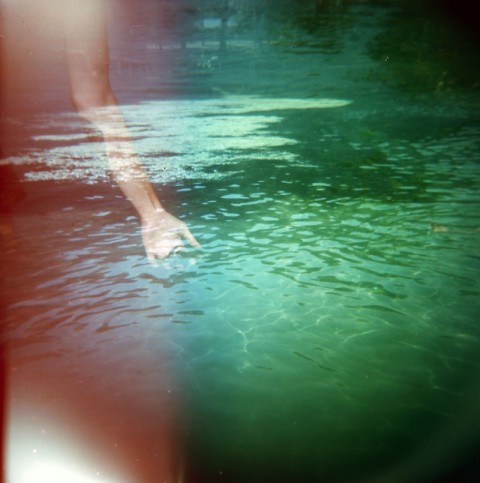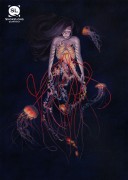Leeasha went in with all her clothes on because it seemed like a good idea but now she’s more uncomfortable than before.
“Put your nose down to the bottom,” says Leeasha’s brother, Will. “Smell it.”
Drowning is interesting and can happen when people smell the floors of things filled with water. Leeasha kicks Will in the head and says, “Smell it yourself.”
Will leans on the edge of the pool, hard, letting quantities of water seep into the grass.
“Let’s get donuts,” Leeasha says and they pile out, taking the hot road carefully in their bare feet. They fish for change in their sodden pockets. A donut is cheap, but a hard thing to eat in this weather. The air is hot, wet, a weight around their necks. Will likes it; he says it’s like meat. “It’s like every day is the ocean,” he says. It’s a response to Leeasha who has scrunched up her face the way she always does when she has to walk into the weather. They argue regularly about the ocean and what it’s like.
“The ocean is calm and cold,” says Leeasha.
“It’s just like this day,” says Will.
“It’s like an Antarctic storm,” says Leeasha.
“It’s like a insect’s insides,” says Will.
“It’s a cold, deep place,” says Leeasha. “The animals fall to the bottom and don’t make it back in time to live.”
They turn the corner and there’s a commotion outside the donut store. A man is being taken off a Greyhound and bus people have spilled everywhere, watching quietly in the heat. There’s an ambulance. Seconds pass and the man is put on a stretcher. He tries to walk away. He’s not used to being put places but it’s happened before. It’s the being afraid that’s the problem; without that he can disappear among other people for years at a time. He’s learning how to be afraid quietly, but it’s hard. He’d been screaming, shaking, trying to get off the bus, and he hadn’t realized until too late.
Leeasha is stumped by this scene, appalled. This is her neighborhood. She doesn’t want people in it.
“This sun wears me out,” says a man, propped against the bus, and many people nod. Leeasha agrees but cannot stand the look of the man. She walks past, dragging Will inside, furious; he is craning after the man on the stretcher. A conviction has overtaken her: of the people in the world, the man on the stretcher is her favorite. She aches to give him the gift of privacy, but she can’t do it alone.
The donuts are small and hard and they look old. There are all these different donuts in bins, with no light to see them by except the sun, which is all the way outside. The smell of the donut store is like the smell outside, only more: it’s a sweet, high-pitched, sharp smell, one that gets into people’s heads and makes them ill from the inside.
“The donuts are bad today,” says Will, who is wringing his Stegosaurus t-shirt onto the donut store floor and peering into the bins.
“They’re always bad,” says Leeasha.
“They aren’t,” says Will. He kicks her foot, hard. “And today they’re extra bad.”
Leeasha punches Will in the head; she orders a small brown donut.
The man is being wheeled into the ambulance. “He’s on something,” says an onlooker, holding a donut. A woman says, “Someone needs to grab his tongue so he don’t swallow it,” and she is scowling.
Suddenly the ambulance is gone and the bus driver is rounding people up. Leeasha was paying for the donuts; she missed the threads that carried them from that moment to this one. They walk out. “They taste better at home,” she says to Will, angry with herself, but he’s already got one in his mouth and she knows, too, the location won’t change the donut. That in fact it’s better to eat a donut, if you have to, away from your house. She’s wearing bright pink toenail polish and she looks down at her feet there in the heat and the sun.
Finally Will has mashed the fourth donut into his mouth, bits spilling out. “Yummy,” he says, nearly indecipherably. He knows denying the terribleness of the donuts will annoy Leeasha more.
As they walk their backyard comes into view, with its wading pool and a broken, rusty swing set whose sides are decorated with brown and orange flowers. The green of the yard is startling. The trees look like lace and the grass looks like lace. There are animals in the grass, sick from the lace. There are bees in the air, sick from the noise. The noise is whipping the street into a state of motion. Wind chimes, street cleaners, and the thick busy weaving of cloth. A dragonfly, his momentum far greater than his weight, explodes into shards. Leeasha looks for a great nothing, a colossal and plentiful nothing, but there isn’t one. She looks for the weavers and sees nothing. It’s just animals, she thinks, weaving in the heat, and they are harmless. But the sound makes her afraid.
Will has gone back into the pool; he’s complaining about the water. It is stagnant, he says. Diseases are thriving in it, he says. It is too hot, he says, like lava. Leeasha stands on her toes. Concrete that feels like the sun is below her feet. She’s waiting to eat her donut. It wasn’t long ago that her hands were wet from the swimming pool, her sleeves and cuffs dripping onto the street, and she’s afraid she’s gotten her donut wet. But her hands are not wet from the swimming pool anymore. The water evaporated by the passage of time.

Notes from Guest Reader Rosie Forrest
There’s a raw quality to this one. The figurative language pops, and it feels about something much larger than a brother/sister moment.


 The core workshop of SmokeLong Fitness is all in writing, so you can take part from anywhere at anytime. We are excited about creating a supportive, consistent and structured environment for flash writers to work on their craft in a community. We are thrilled and proud to say that our workshop participants have won, placed, or been listed in every major flash competition. Community works.
The core workshop of SmokeLong Fitness is all in writing, so you can take part from anywhere at anytime. We are excited about creating a supportive, consistent and structured environment for flash writers to work on their craft in a community. We are thrilled and proud to say that our workshop participants have won, placed, or been listed in every major flash competition. Community works.